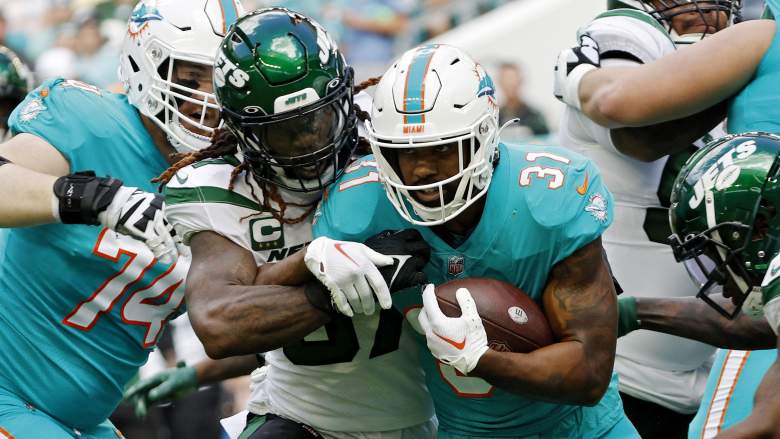
Getty New York Jets linebacker C.J. Mosley makes a tackle during the 2022 regular season.
The New York Jets currently have a little over $9 million in available cap space — and yet they’re still expected to trade for Green Bay Packers quarterback Aaron Rodgers, extend defensive tackle Quinnen Williams, and potentially sign a veteran center like former Tennessee Titan Ben Jones.
Fans ask us all the time how this is possible, and the answer is financial flexibility. General manager Joe Douglas was brought in — in part — to clean up a disastrous spending spree by ex-GM Mike Maccagnan. Douglas has not delivered on all of his promises since taking the job, but he’s certainly delivered on that one.
This offseason alone, the Jets were able to restructure several veteran contracts including C.J. Uzomah, D.J. Reed Jr., Laken Tomlinson, Tyler Conklin and John Franklin-Myers. This built-in flexibility has helped Douglas and head coach Robert Saleh retain numerous veterans that were looked at as potential cap casualties at the start of free agency.
Having said that, three big-name starters could still be asked to rework their deal, according to The Athletic’s NYJ correspondent Zack Rosenblatt. Those players are linebacker C.J. Mosley, defensive end Carl Lawson, and wide receiver Corey Davis.
Jets Could Be Waiting on Aaron Rodgers Trade to Rework Big Money Contracts
During a mailbag article on April 7, Rosenblatt addressed the $48 million in combined cap space between Mosley, Lawson and Davis when asked how the front office can “expect to carry” these contracts into the 2023 season.
“The answer is they can’t,” the beat reporter replied. “They just haven’t changed anything with those three players yet because there is no rush to do so. Once the Rodgers trade makes real progress, they’ll need more cap space — they can’t even fit Rodgers’ 2023 cap hit ($15.8 million) as things currently stand — and that’s when you’ll see movement on Davis, Mosley and Lawson.”
Even after Odell Beckham Jr. chose to sign with the Baltimore Ravens, Rosenblatt admitted that he’s “skeptical” that the Jets would keep Davis at his current cap hit when they could save $10.5 million by trading or releasing him. At the same time, Saleh did hint that Davis was a part of their offensive plans in 2023, so perhaps a minor pay cut would solve this problem.
If the Jets decide to play hard ball, keep in mind that Jamison Crowder took a 50% pay cut to remain with the Jets in 2021. Douglas could try something like that with Davis or settle on a number somewhere in between $11.16 million and $5.58 million (50%).
As for the other two, Rosenblatt believes a contract restructure is surely on the horizon. “They can also cut other players for savings, like the aforementioned [Bryce] Hall and [Ashtyn] Davis, but the likely route is restructuring Mosley ($21.47 million cap hit) and/or Lawson ($15.73 million) at some point.”
Remember, Saleh practically ensured Lawson’s safety for the final year of his deal, so a conversion of base salary into a signing bonus — with the addition of void years — is the likely move here. Mosley’s situation could be a little more complicated.
Jets Insider Explains How a C.J. Mosley Contract Restructure Might Work
In a previous article on January 24, Rosenblatt actually detailed how a Mosley contract restructure might go — so we’ll revisit that now.
“There is no scenario in which the Jets can go into 2023 with Mosley on the books for a $21.4 million cap hit,” he wrote at the time. “An ideal outcome would be something like what the [New York] Giants pulled off with Sterling Shepard last year: Having Mosley agree to a reduced salary and chopping the last year off his contract to get him to free agency after 2023 instead of 2024.”
“Even though Mosley did just make the Pro Bowl and All-Pro, he wouldn’t make as much money in free agency as he’s set to with the Jets,” Rosenblatt concluded, “so there might be a happy medium for both parties.”
The Jets don’t want to cut Mosley, but they could save $17 million in cap space each of the next two seasons if they choose to do so after June 1 — per Over the Cap. That gives Douglas power at the bargaining table.
The organization would incur a dead cap hit of $4.476 million each of the next two years and nearly $3M in 2025 if they go this route, but Mosley would also enter the open market after teams already have their rosters settled — meaning he’d probably have to sign for a fraction of his current salary.
As Rosenblatt stated, there’s probably a “happy medium” to be had here, the Jets just have to find it in the event that they need the money.